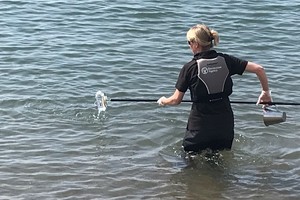Three French MEPs are urging Brussels to take against the UK after it let huge amounts of raw sewage be discharged into the English Channel and the North Sea.
"We fear negative consequences on the quality of the marine waters we share with this country – both in terms of marine biodiversity and on the activities of fishermen and shellfish farmers," the three MEPs wrote in a letter to Environment Commissioner Virginijus Sinkevičius on Wednesday.
Pierre Karleskind, Nathalie Loiseau and Stéphanie Yon-Courtin (all members of the centrist Renew group in the European Parliament and Macron's En Marche party in France) blamed the UK for "exempting itself from environmental requirements" as outlined in EU policy.
Although the UK has exited the EU, it is committed to protecting shared waters based on UN conventions, the MEPs argued. In addition to the UN Convention on the Law of the Sea, the MEPs stressed the UK's obligations under the EU-UK Trade and Cooperation Agreement ( a Brexit treaty).
"Despite this, the UK has chosen to lower its water quality standards. This is unacceptable and calls into question the efforts made by EU Member States over the last twenty years. The UK is committed to preserving the seas that surround it and that we share," they wrote. The MEPs called on the Commission to "use all political and legal means at its disposal to stop this situation."
A UK government spokesperson claimed the allegations were "simply not true", the BBC reported.
Public health and environmental catastrophe
Last week, the UK's environment agency put out "do not swim" warnings on 22 beaches in the UK because of sewage discharge. Flooding has been exacerbated by this summer's hot weather, which has baked soil so that it cannot absorb rain. This has left sewage networks unable to cope and sewage companies release "overflows" into rivers and seas to stop further floods.
However, some argue that sewage companies don't do enough to prevent these situations. In a joint letter, Professor Chris Whitty (Chief Medical Officer for England), Jonson Cox (chair of Water Services Regulation Authority Ofwat), and Emma Howard Boyd (Environment Agency chair), stress that using these overflows during storms "is now not exceptional."
"In some cases, up to 200 discharges a year are taking place," they added. "This is obviously unacceptable on public health grounds."
According to a spokesperson from the UK's Department for Environment, Food and Rural Affairs, the government is set to launch a large-scale plan to reduce sewage overflows.

